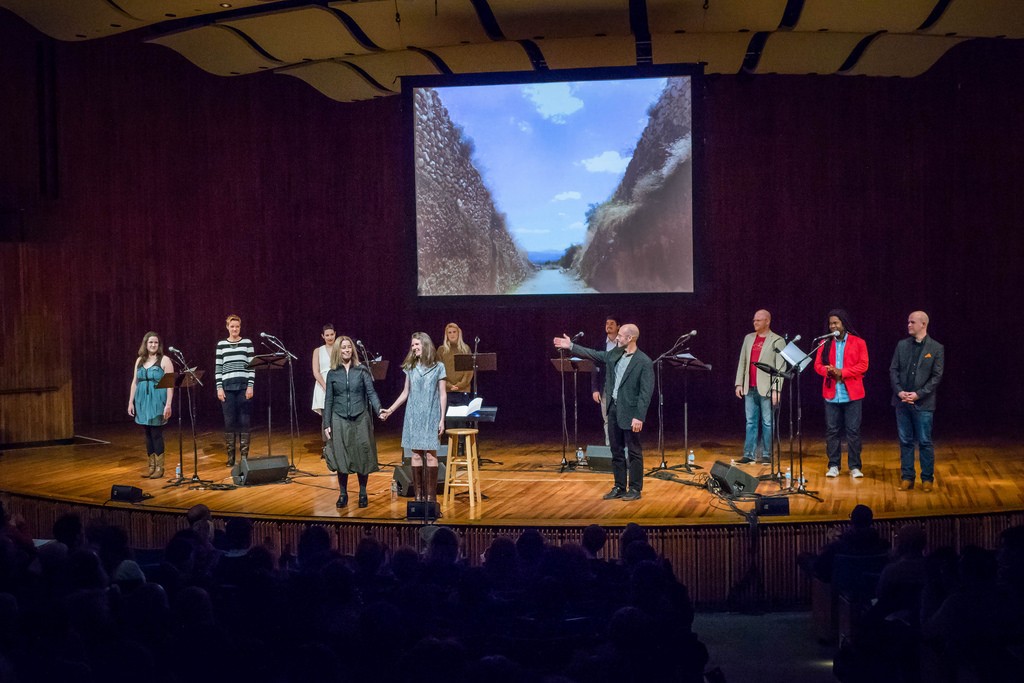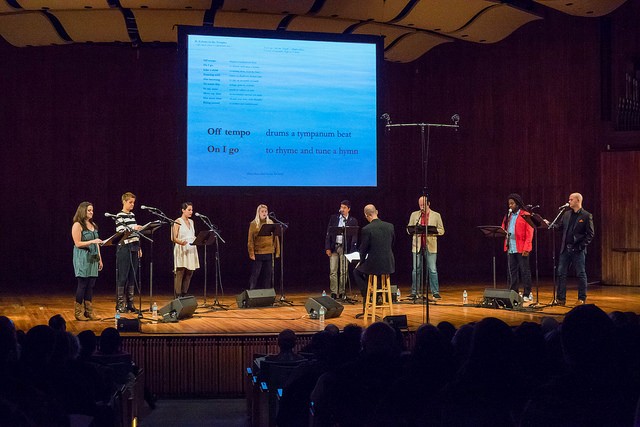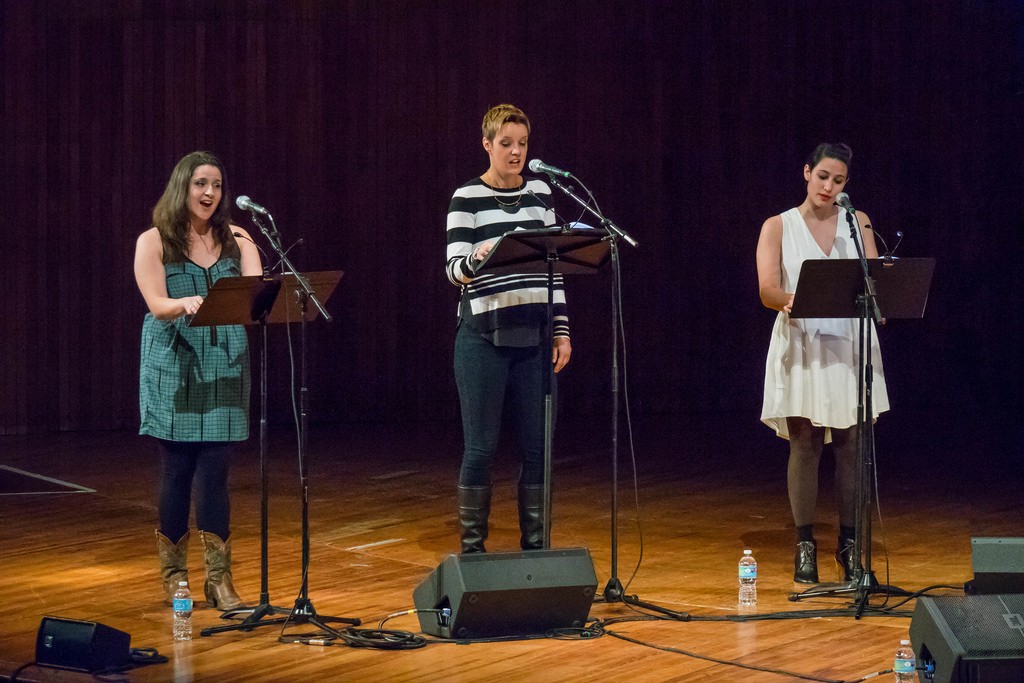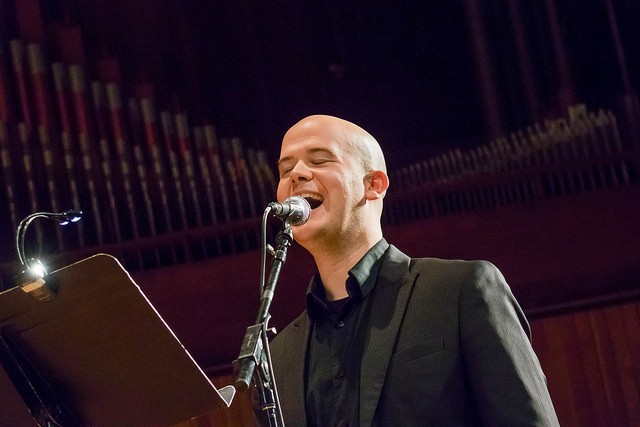When the gods hand you a gift, they also hand you a whip for self-flagellation, to paraphrase Truman Capote. The Cassandra story typifies the blessing-and-coeval-curse topos. Apollo gives Cassandra the gift of prophecy to seduce her. When she refuses, he punishes her with the curse of never being believed. Eventually, the ignored prophetess goes mad.
This epic tragedy is the starting point for Elena Ruehr’s new a cappella opera Cassandra in the Temples, which recently premiered in Kresge Auditorium at MIT, as part of the new music series MIT Sounding. Ruehr, a Lecturer in Music at MIT, was awarded the Guggenheim fellowship earlier this year to compose and produce this opera for the Grammy-winning vocal octet Roomful of Teeth. She collaborated with librettist Gretchen Henderson, a former Mellon postdoctoral researcher at MIT, to develop the narrative for this 13-movement, 40-minute production based on the themes of the myths surrounding the Greek heroine Cassandra.
Cassandra in the Temples
For Ruehr and Henderson, the Cassandra story is a vehicle to raise questions about prediction and prophecy, delusion and vision, the nature of belief and doubt and the fate of the rejected prophet – themes that resonate with contemporary society. Citing everything from Al Gore’s “An Inconvenient Truth” to fear mongering in the press to falsehood in media coverage of sex abuse scandals and racial conflicts, Ruehr asserts, “It now seems particularly timely to explore the idea of a person or group of people who predict disaster, as we are inundated with apocalyptic visions of the future in contemporary culture.”
This work provided Ruehr a chance to bring together two of her seemingly diverse performance aesthetics – world music and the classical voice. Roomful of Teeth’s specialization in world vocal techniques allowed the composer to expand her vision beyond what is possible when writing for strictly classically-trained singers. The resulting opera utilizes the range of Roomful of Teeth’s vocal techniques, such as throat singing and singing influenced by Bulgarian women’s choirs, and relies on no instruments except the human voice. As Brad Wells, Director of Roomful of Teeth, said, “The voice becomes an oboe; now, it’s a clarinet. It has a broader range than we give it credit for.” Ultimately, Cassandra in the Temples will be staged in a celebration of bodily expression through both voice and dance.
Cassandra in the Temples is set in temples, both Vitruvian and anatomical (the space between the temples of the head houses thoughts and memories). The opera unfolds over the course of a single day, with each hour tied to events in Cassandra’s life, death and mythic afterlife. In this poetic adaptation, snakes become a recurring motif, manifesting as sacred, healing serpents, monstrous sea serpents, historic map markers (designating terra incognita), or the dormant yogic serpent that aids meditation and enlightenment. The third movement, “Whispering of the Snakes: There’s something to the salience of hissing,” is constructed entirely using sibilance (stressed “s” sounds), unlike the vowel sounds librettists often use to carry sound forward, Henderson points out. Wordplay — such as the homophonic lines, “Lie here,” “Lyre?” and “Liar!” in the sixth movement – conveys the difficulties in reconstructing and interpreting fragmentary texts.

Roomful of Teeth Residency
This project, and its accompanying residency for Roomful of Teeth, was part of MIT Sounding, a new annual performance series. While in residence, Roomful of Teeth visited numerous classes and student groups for workshops and individual vocal coaching, including Introduction to World Music, Introduction to Western Music, the Composers Forum, the Concert Choir, Chamber Chorus, acappella and jazz groups, and the Arts and Burchard Scholars. Both Gretchen Henderson and Elena Ruehr extended themselves to writing students in the classes Playwriting I, Techniques of 20th-Century Composition and Script Analysis. Henderson also met with the First-Year Arts Seminar Advising Program (FASAP), and Ruehr met with Professor Peter Child’s Senior Seminar to orient the students to opera. Roomful of Teeth’s week-long residency culminated in a concert in Kresge, where the group performed world premiers of both the poetic opera Cassandra in the Temples and Borderland: a cantata in memory of the victims of the Ukrainian conflict by Christine Southworth and Evan Ziporyn, followed by Allemande (from Partita for 8 Voices) by Pulitzer prize winner Caroline Shaw, Run Away by Judd Greenstein and Otherwise by Brad Wells.
Elena Ruehr’s Recent and Upcoming Premiers & Performances
Cassandra in the Temples was the third in a string of world premiers happening in November for Ruehr. Her cantata, “Eve,” debuted Nov. 8 in Boston, and “It’s About Time,” a chamber piece, had its first performance Nov. 16, in San Francisco. “Eve,” a work for chorus and orchestra, set to text from Genesis 3, recounts the story of the Fall. Ruehr approached the Adam and Eve story with Miltonian emphasis on the choice to gain knowledge rather than the forfeiture of paradise. “Eve,” was performed by the Cantata Singers and directed by David Hoose. It’s About Time, was commissioned by San Francisco Contemporary Music Players as part of Project TenFourteen – four concerts with world premieres from ten distinctive composers all challenged to “reflect upon and address the human condition, common to us all.” Ruehr says, “It’s About Time begins with an expression of joy in its simplest and most honest form.” With echoes of Vivaldi and rhythms of distant cultures, she creates the persistent sense of elation throughout the individual movements.
In this extraordinarily active year, Ruehr has addressed the epic, the tragic, the ancient, the biblical, the exultant, the primal and the sublime – in short, the gamut of human experience. And there will be no resting on laurels for the MIT Music professor. She is currently working on a commissioned piece for the Radius ensemble and planning several concerts for spring, including a new viola concerto for MIT Professor Marcus Thompson and the New Orchestra of Washington. In January, her new chamber music CD Lift will be released, and the New Gallery Concert Series is hosting a CD release party, where she will perform her second violin sonata with Irina Muresanu (violin) and Sarah Bob (piano) on Jan 29 2015. Next, she will work with the Alabama Symphony Orchestra who will perform her piece “Shimmer” on Feb 21, 2015. Ruehr says, “This concert is especially close to my heart because the conductor, Alan Pierson, is my former student and has become a good friend.”
Roomful of Teeth’s residency at MIT was sponsored by the Center for Art, Science & Technology (CAST).
Learn more about Roomful of Teeth.
Learn more about MIT Sounding.







